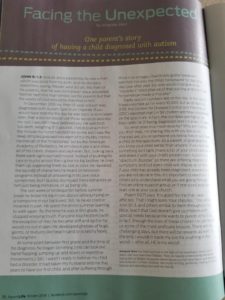
The Power of the Tongue

Abuse doesn’t just happen in trailer parks. It doesn’t just take up residence on the “wrong side of the tracks,” or to families living below “poverty level.”
Abuse happens on Main Street.
And, on your street.
Sadly, the one who should love us the most, sometimes hurts us the most.
Proverbs 18:21 says, “Death and life are in the power of the tongue.” We can use our mouths to encourage or destroy. Build up or tear down. “
Sticks and stones may break my bones, but words may never hurt me” is a lie! Your words can destroy the lives of your children. They hold power over your spouse, over your family members, and your coworkers.
Will they “poke holes” in those around you for decades to come, or will they instill value and purpose?
How to discern a toxic “Christian”
These are possibly the most heartbreaking words written in the bible.
God’s word here is final.
No second chances.
His words mean this person will spend an eternity apart from the One
they believed they were serving.
“On that day, many will say to me,
Lord, Lord, didn’t we prophesy in your name,
drive out demons in your name,
and do many miracles in your name?”
(Matthew 7:22)
How does a person die believing they’re a born-again Christian,
then face God only to hear they were never His child in the first place?
And, how can we know who these false Christians are?
The bible warns us to be on guard:
“Be on your guard against false prophets
(fake Christians)
who come to you in sheep’s clothing
(as innocent, loving, caring),
but inwardly are ravaging wolves.”
(divisive, cunning, manipulative.)
(Matthew 7:15)
Examine their lives based on the example below:
“You’ll know them by their fruit.
Are grapes gathered from thornbushes or
figs from thistles? (vs 17)
In the same way, every good tree produces good fruit,
but a bad tree produces bad fruit.
(vs 18) A good tree can’t produce bad fruit;
neither can a bad tree produce good fruit.
(vs 19) Every tree that doesn’t produce good fruit
is cut down and thrown into the fire.
(vs 20) So you’ll recognize them by their fruit.”
(Matthew 7:16–20)
Are they producing BAD FRUIT?
“Now the works of the flesh are obvious: sexual immorality,
moral impurity, promiscuity, idolatry, sorcery,
hatreds, strife (stirring up trouble),
jealousy, outbursts of anger,
selfish ambitions,
dissensions
(disagreements that lead to conflicts with others),
factions (forming divisive groups),
envy, drunkenness,
carousing (drinking and being loud),
and anything similar. (vs 21)
Those who practice such things will not inherit the Kingdom of God.”
(Galatians 5:19–21)
Look closely at Proverbs 6:16-19:
“The Lord hates six things; in fact, seven are detestable (despicable) to him:
- Arrogant eyes (An exaggerated sense of one’s own importance or abilities)
- A lying tongue (lies about others, embellishes situations)
- Hands that shed innocent blood (no one is immune to their wrath)
- A heart that plots wicked schemes (actively looks for ways to sow discord, cause trouble where there was none, keep conflict going, stir-up drama)
- Feet eager to run to evil (loves to hear juicy gossip so they can share it with others for the purpose of causing division, always in the middle of drama.)
- A lying witness who gives false testimony (twists situations/words to suit their agenda)
(vs 17) “Now I urge you, brothers and sisters (Christians),
to watch out for those who create divisions
and obstacles contrary to teaching you learned.
AVOID THEM,
because such people do not serve our Lord Christ
but their own appetites (desires).
They may be your friend, neighbor, church member, family member, etc.,
yet their hidden agenda is to stir up trouble inside the church,
cause dissension inside your family and sow discord wherever they go—all the while
portraying themselves as a dedicated Christian
with your best interest at heart.
They may even use scripture as an excuse for their hateful attack.
Below are traits of what the world calls a TOXIC PERSON / NARCISSIST:
(definition: a person who has an excessive interest in or admiration of themselves)
* Speak badly about others * Talks more than listens
* Treats others poorly * Lies to you
* Are self-obsessed * Loses their temper
* Plays the victim * Tries to control, manipulate you
* Gossips * Are negative
* Criticizes you * Lack compassion
* Always has to be right * Constantly have drama going on
Every single one of these actions by a toxic, narcissistic person
are listed in Galatians 5:19-21 and Proverbs 6:16-19 (as listed above)
Are toxic, narcissistic people beyond the redemptive saving power of God?
Absolutely not.
“For ALL have sinned and come short of the glory of God.”
(Romans 3:23)
We are all sinners with a fleshly nature that craves these toxic habits,
but we don’t have to give in and let them win. As genuine Christians,
we must die to ourselves every single day.
“Now those who belong to Christ Jesus have crucified the flesh with its
passions and desires.” (Galatians 5:24)
Can Christians be toxic people?
Absolutely.
But, if it’s a continual pattern where they DO NOT choose to acknowledge
the discord they create among others, they do not take responsibility
for the slander they’ve shared, the lies they’ve spread,
the hurt they’ve caused, their indifference toward the suffering
they inflicted on others… etc… then, I would have to question
if they had a genuine, life-altering salvation through Jesus Christ,
or if they are a—fake Christian.
When we humble ourselves and ask Jesus into our heart, the Holy Spirit
indwells within us. He guides us toward asking forgiveness from those we’ve wronged.
He prods us, reminding us when we “come short of the glory of God,” which for me,
is every single day. As it should be with other Christians as well.
Salvation doesn’t make us perfect. It makes us forgiven.
We must pray, study our bible, and in every situation extend grace toward others.
As genuine Christians, we must be willing to
actively love one another— not just SAY we do.
“Love is patient, love is kind. Love does not envy, is not boastful,
is not arrogant, is not rude, is not self-seeking,
is not irritable, and does not keep a record of wrongs.
Love finds no joy in unrighteousness but rejoices in the truth.
It bears all things, believes all things,
hopes all things, endures all things.
Love never ends.”
(I Corinthians 13:4-8)
As we walk this journey together, toxic “Christians” will mar our pathway.
We must pray for their blind eyes to be opened, so they never hear the words,
Broken Beyond Repair

Last week I broke my favorite necklace — a Mother’s Day gift from my husband six years ago. Thinking it was a total loss, I was ready to throw it in the trash. My husband said, “Don’t throw it away. I can fix it.” I argued and said, “Don’t bother. It’s broken beyond repair.” The next day he surprised me with the necklace – it was new again. Is there a circumstance in your life that’s “broken beyond repair?” Maybe it’s a relationship with a friend or relative, finances, your health…
ParentLife Oct, 2018 article

